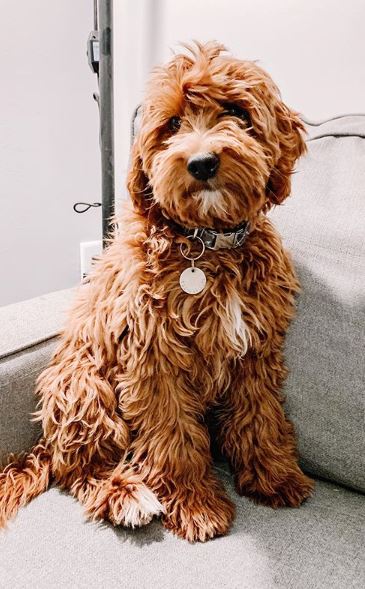If you are searching for a new dog and it comes down to Labradoodle or Cockapoo, it is going to be a callous decision to pick one. Both of these poodle mixes are super cute, very popular, and have an excellent reputation with families.
Although they have a lot in common, there are some subtle differences between a Labradoodle and a Cockapoo that you probably didn’t know.
I have divided them into ten topics so you can learn everything about these two hybrid dogs and decide the one that suits better for you and your family.
Let’s take a look at the Labradoodle vs. Cockapoo debate.
Contents
Labradoodle VS Cockapoo

Cockapoo 
Labradoodle
Origin
In 1988, Australian Wally Conron purposefully crossed a Standard Poodle with a Labrador Retriever to create a non-shedding hypoallergenic guide dog for the people with pet allergies and named the hybrid Labradoodle. However, it created many controversies, and Wally was soon discouraged by some pure breeders and The Kennel Club. They even threatened to remove him from the registry and accused him of corrupting the works of pure breeders. Because of their friendly nature and trainable personalities, Labradoodles are still being used as guide and therapy dogs.
An adorable small dog with a big dog’s personality, the Cockapoo is the first designer dog and has been around since 1960. They originated in the united states and also known as Cockerpoo, Cockerdoodle, or Spoodle. The Cockapoo is a cross between a Cocker Spaniel and Poodle (usually a toy or miniature poodle). These hybrid dogs are highly intelligent, hardly sheds, and so affectionate that you will never feel alone.
Personality
Known for their intelligence and calm temperament, Labradoodles are fantastic companion dogs. The Labradoodles are full of energy, and their personality is so affectionate and friendly that they often need to be trained to brace their excitement. Due to their intelligence, they process information rapidly, and one of the clever canines. Like other hybrid dogs, the Labradoodle’s temperament largely depends on the personalities of its parents. In general, Labradoodle is typically happy and eager to please its people.
Cockapoos have the traits of hunting dogs due to their parent Cocker Spaniel which are excellent hunters. They are also friendly, intelligent, and energetic dogs, which is why they love to work on mental and physical challenges every day.
Cockapoos are not aggressive, but they can be very creative when bored, such as barking, jumping, and chewing furniture. So they are perfect for people with an active lifestyle. They adapt well to your daily routine and loves to follow you around the house.
Both dogs have really good temperament. Because of their Poodle parents, both of these hybrids are also highly intelligent.
Appearance
Both the hybrids are insanely cute. However, they have some physical differences that span further than just height.
Labradoodles can come in three different sizes (Standard, Medium, and Mini). They can grow up to 24 inches (53 cm) and weigh up to 60 pounds (27 kg).
The size and weight of a Cockapoo vary significantly on the size of its parents. They can grow up to 15 inches (38 cm) and weigh up to 24 pounds (11 kg).
Training
Labradoodles have the energy of a Labrador and their work ethics of both Labradors and Poodles. They are very enthusiastic, and their eagerness to please makes it easier to train them. Like all other dogs, consistency and repetition are a must. They need rules and benefit from schedules and training sessions. These sessions should be performed daily and kept short.
Similar to the Labradoodles, the Cockapoos are relatively easy to train. They do well in obedience, and with the right training techniques and proper handling, this dog will thrive. They require firm handling but can be somewhat sensitive to the tone of your voice. So the training should be consistent and will require positive reinforcement.
Time Investment
Both the Labradoodle and Cockapoo require the same amount of time each day. Besides daily training, you will need additional time for taking them out for a walk several times, grooming, caring, and cuddling sessions.
Cockapoos need less exercise than Labradoodles but they will still need daily exercise. They love to get out of the house to run around and chase things. Labradoodles will require enough exercise and an outdoor activities to keep them from getting restless and bored.
You will need to spare at least 2-3 hours a day to care for these dogs properly. If you live with a family or with your partner, you can easily split the session with each other. The dog will love to spend time with all of you.
Coat Type & Grooming
The Labradoodle has three different coat types. Each of these coats also has variations. The three main coat types are Fleece, Wool, and Hair. Usually, Labradoodles don’t shed excessively, but the Hair coat type is the exception to this rule.
Labradoodles Grooming requirements vary depending on the length and type of their coat. Generally, you can expect to brush a Labradoodle about once or twice per week. You may also clip or trim their coats every six to eight weeks to keep them easy to maintain.
Cockapoos may inherit their long, silky hair from their Cocker Spaniel parent, or the poodle’s curly hair or a combination of the both.
The Cockapoo is usually seen au naturel, but many people like to clip the coat. However, you should only trim to 2-3 inches in length. Hair around the eyes should be trimmed to allow visibility. The coat needs to be brushed daily.
Ideal Home
Labradoodles and Cockapoos are excellent choices for first-time dog owners. They learn quickly and don’t require a lot of intense grooming. The fact that these hybrids are very playful and loving with children makes it easy to introduce them to the family. With early and proper socialization, this will be even easier.
Labradoodles are full of energy. So, apartments are not the ideal setting for this energetic dog. They enjoy a bigger house and space to run around.
Although the Standard or Maxi Cockapoos do not adapt as readily to apartment life as their smaller cohorts, they do well if exercised properly. The ideal situation for Cockapoos is a house with a small, fenced yard.
Health Issues & Lifespan
The Labradoodles and the Cockapoos are healthy hybrids but still prone to some health issues throughout their life. They inherit the diseases of both parent breeds.
Labradoodles are prone to conditions such as:
- Hip/elbow dysplasia
- Epilepsy
- Patellar luxation
- Heart problems
- Addison’s disease
- Arthritis
- Skin issues
- Progressive Retinal Atrophy
Labradoodles’ average life span is 14 years.
With Cockapoos, concerns include
- Cataracts
- Hip/elbow dysplasia
- Allergies
- Liver disease
- Glaucoma
- Patellar luxation
- Ear infections
The average lifespan of Cockapoos is 15 years.
Diet
Because of the different sizes of these dogs, there is no exact blueprint of how much to feed your dog.
The amount of food they need also depends on their age, weight, and activity level. But it can be clarified that these dogs will need high-quality food of high protein to grow up healthy and enjoy a happy and long life.
If you are not sure how much to feed your dog, you can generally calculate 25-30 calories per pound of their weight. Puppies might need a bit more than the adults because they are still growing and more active.
Also, Labradoodle will need more food because they are heavier and taller than the Cockapoos.
Costs
The cost of buying a dog varies and depends on many factors such as the breeder reputation, the litter size, specific color, and lineage of the puppy. The average cost of a Labradoodle puppy can be somewhere around $900 and Cockapoos $700.
If you want a specific look or puppies with the highest quality, you can budget for a Labradoodle anywhere from $2,300 – $5,000 and Cockapoo $1700 – $4300.
Besides these costs, you have to pay between $500- $1000 a year for vet bills, food, toys, and much more.
Which One Is Right For Me?
Couple of things that you will need to consider when choosing between these two hybrids.
- Can you handle a larger dog?
- Do you have enough time to groom them?
- Can you take them out for a walk every day?
- What is your living situation?
- Do you prefer a smaller or larger dog?
Either way, both these dogs are fun, super friendly, easy to train, and great companions. Now that you have all the information, it is totally up to you to decide which dog is right for you.
Leave a Reply